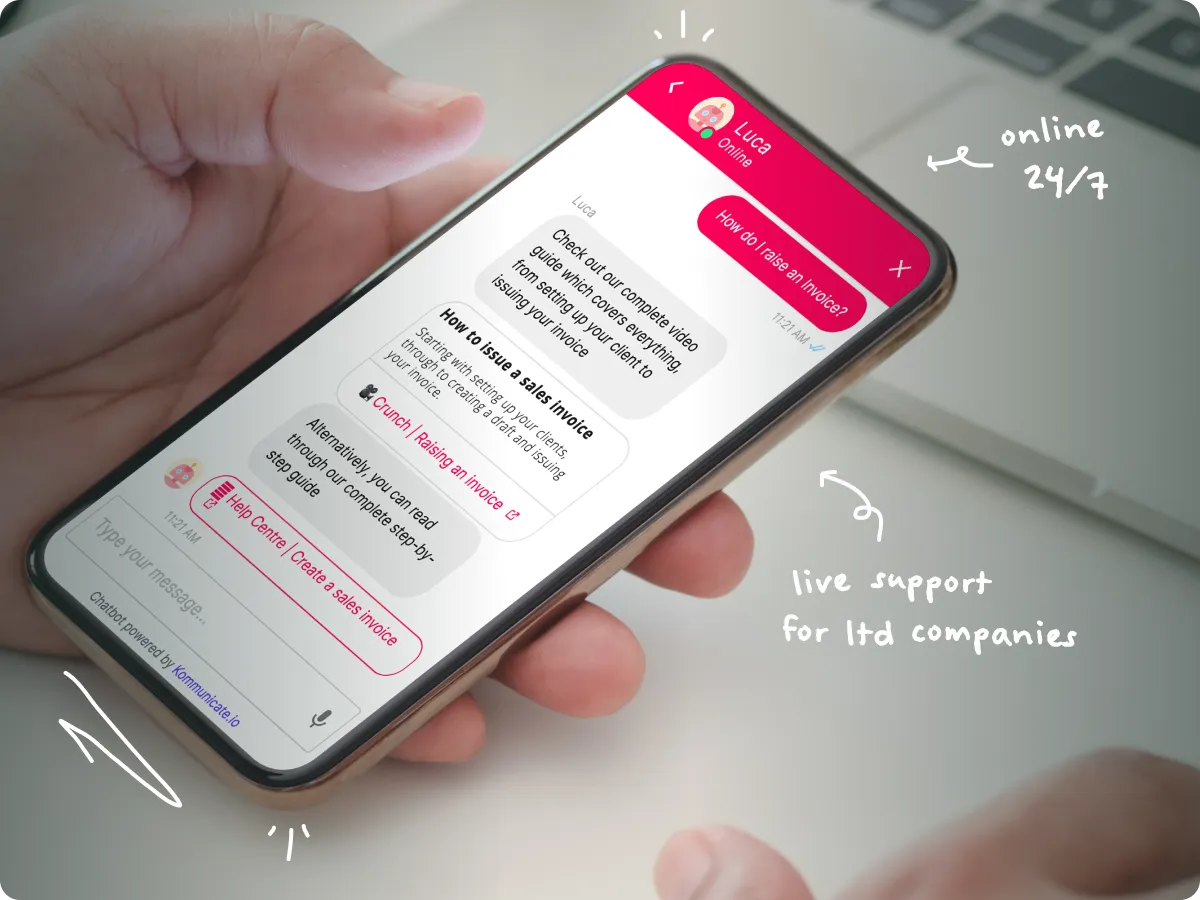Whether you decide to operate your business as a sole trader or limited company, you’ll have to come up with a name for your fledgeling enterprise. Although it may seem like a trivial decision, for many businesses just starting out it can take days, even weeks, to come up with a business name they’re happy with.
If you'd prefer to watch a video, we cover this in our jargon-free Take the Leap video about setting up and registering a business.
Naming your business
So you've decided to set up your own business, one of the very first things you need to do is decide what it's going to be called. Your business name can be anything, within reason! There are slightly different rules, depending on whether you're setting up as a sole trader or setting up a limited company (if you're not sure which is best for you, check our article sole trader vs ltd company.
The rules for sole trader businesses are fairly simple, sole trader names aren’t allowed to:
- Include ‘limited’, ‘Ltd’, ‘limited liability partnership’, ‘LLP’, ‘public limited company’ or ‘plc’
- Be offensive
- Be the same as an existing trademark
- Suggest a link to any government or local authority without permission
If you've decided to go down the limited company route, there are a few more things to consider.
Company Naming Tips
- You can search for available names on the Companies House site, or via one of the hundreds of company formation specialists. The first step is to ensure that your proposed name is available
- Keep your name choice business-like, as your credibility will be undermined if you use an unprofessional name
- Find the right tone for your name, according to the type of business you are in. A software engineer might choose something technical, whereas a retailer might go for something more eye-catching, for example
- Your name cannot be too similar to a currently live company name, according to naming rules laid out by the registrar of companies
- You must also steer clear of using words and expressions deemed to be ‘sensitive’ by Companies House (more below)
- Make sure you search for suitable domain names simultaneously, to provide a matching online identity to your corporate one. It is wise to safeguard your online identity against future competitors who may think they can benefit from owning ‘your’ domain name
- If you are going to conduct business overseas, double-check your proposed name to ensure you don’t cause mass offence abroad!
- For obvious reasons, steer clear of any trademarked names or expressions
- Try to think long-term. Do you want to expand your business into new areas, or offer new services in the future? If so, don’t focus your name choices based solely on what your business offers right now
- You may decide to use brand names for business purposes, or if you run several businesses through a single company, so your choice of company name is likely to be of secondary importance to your brand naming
Limited or ltd - does it matter?
Some companies suffix their name with “Limited”, others use “Ltd.”. You may be wondering what the difference is. The simple answer is that there is no difference. It is purely an aesthetic decision, and has absolutely zero impact on the way you run your company.
The two suffixes are completely interchangeable, and there are other permutations available too. If you register a limited company called “Dave’s Bouncy Castles”, any of the following would be acceptable:
- Dave’s Bouncy Castles Limited
- Dave’s Bouncy Castles LIMITED
- Dave’s Bouncy Castles Ltd
- Dave’s Bouncy Castles Ltd
- Dave’s Bouncy Castles LTD
If you choose to use our Crunch Formations service (and you should it's super easy and free if you get accounting from Crunch) then your name will be given the suffix “Limited”, however, any of the above variations are legally acceptable.
Trading name vs company name
Limited company names are like website addresses – there can only be one of each. If you want to set up Delicious Cakes Ltd, you’ll probably find some enterprising baker has already registered it. However, all is not lost.
Limited companies can use trading names, meaning that you can still trade as Delicious Cakes as long as you’re not infringing another company’s trademark. But how do you do this?
Very simply, actually. Unlike company names, trading names do not require registration. All you have to do is invent one, and make sure you’re not in breach of trademark (You can search for potential conflicts on the Intellectual Property Office website). At the bottom of all your paperwork (invoices etc.) make sure you display your correct company name, like so:
Delicious Cakes is a trading name of Reconstituted Meat Desserts Ltd.
Trading names also allow you to have multiple functions for a single limited company. For example, you may be a freelance web designer who also does SEO work. Under the limited company Super-Duper Web Design Ltd. you could operate two trading names – Super-Duper Design, and Super-Duper SEO.
So, if some rotter has already registered your perfect limited company name, don’t fret – you can still use a trading name to keep hold of your identity!We cover this and more in our article: 'Trademarking a company - everything you need to know'.
Sensitive Words and Expressions
Aside from the more obvious rules, such as not choosing a name that could be deemed offensive, there are a number of ‘sensitive’ words and expressions that can only be used if you are qualified in some way, or have had permission from a Government or professional body to use.
Examples include words such as ‘association’, ‘assembly’, ‘chemist’, ‘dentist’, and any words that imply a link with the Government when one does not exist.
For the official guide to company naming and incorporation, read guide GP1 on the Companies House website.
Things to consider when naming a company
Brevity
As a general rule, try to keep to no more than two syllables and no more than ten letters. A simpler name is easier to remember and therefore easier to search for on Google. If the Southern Ohio Amalgamated Steam Traction Engine and Boiler Manufacturing Company hadn’t closed down in 1927, it’s a pretty safe bet that they’d have come up with a new name by now.
Discoverability
Organic brand searches (when someone types the name of your business into Google and arrives at your website) bring in between 10% and 50% of traffic for the average company website. Your name has to be easily spelt and not too similar to other results, otherwise, you’ll lose out on potential visitors.
Do a quick search before you decide on a company name to see what competition you’ll have in Google results – if there are some big, established companies in there it might be time to rethink.
Connection
Your name should evoke some sort of connection or understanding. A great example of this is PayPal, which does both – ‘Pay’ tells me what it does and ‘Pal’ evokes the idea of a relationship.
How to choose the name for your company
To make this often-fraught process just a little easier, here are some simple, quick methods for coming up with a company name.
The “name + profession” method
Solid, uncomplicated, and matter-of-fact, this method may be a little dry but it’ll do the job. Simply take your name, append what you do to it, and Bob’s your uncle.
The “sector + animal name” method
If you’re after something a little more fun, the addition of a random animal can work wonders for your company. Firms like PolicyBee, Gopher Money and Wombat Clothing are blazing a trail for animal-based company names, and you could be next. Just remember to choose an animal that people like – nobody will want to hire Dung Beetle Consulting!
The portmanteau method
If you’re a new media whizzkid, your business should have a suitably future-proof name. Why use tired old words to describe yourself when you can invent new words that will make people’s monocles fly from their faces in wonder?
In the same way that Disney coined the phrase Imagineers, you can combine two words to more accurately describe your straddling of two professions.Web designer who also does some Consultancy? You, my friend, are a Web Consultigner. Photographer by day but Engineer by night? Time to register Enginography Ltd.
The “one awesome word” method
Looking for a business name that screams authority, simplicity and a difficult-to-buy domain name? Simply choose a short, snappy verb or adjective and you’ll be set. For good examples see Stomp, Wham, Boost, or indeed, Crunch.
If you’re struggling to come up with a cool enough word, just watch one of the fight scenes from Adam West-era Batman.
The “ideas above your station” method
Ambition is a great thing for any freelancer or entrepreneur to have – indeed, a necessary thing. In the same way that employment coaches will tell you to dress for the job you want, not the job you have, you might feel like naming your company based on what you hope it will grow into, rather than what it is now.
Certainly, “The Website Mega-Warehouse International Ltd.” sounds more impressive than “East Swindon Web Design” – just be careful you don’t get carried away.
The “what do you do again?” method
Maybe you want your business to be cool, enigmatic and elusive? The kind of firm that operates from a top-floor office in the City of London, and always earns loads of cash for doing… something. If this is the image you want to put across, names like “[blank] Solutions” or “The [blank] Group” are your friend.
Sure, it might be a little confusing for people who’ve never heard of your business before, but let’s be honest, they probably couldn’t afford your fees, could they?
Company Naming Do’s and Don'ts
If you’re trying to come up with something wacky or unusual to call your business, here are some Do’s and Don’ts that you can follow to make sure you don’t get too carried away.
DO misspell the name
Sometimes it might just be worth slightly misspelling a word instead of having to pay someone off for a domain. There are plenty of good examples of this, including Flickr, Reddit and Digg.
DON’T make the spelling too irregular
Take, for example, annotation service Diigo. Two ‘i’s can be pronounced the same as one, or as an ‘e’, so you’ll get people searching for the wrong thing. Avoid just sticking a load of letters together and hope for the best.Sometimes it’s possible to take creativity too far. Take, for instance, oooooc.com… it doesn’t tell you anything about the service and it’s also pretty impossible to type. Who’s going to remember how many ‘o’s there are?
DO use exotic domain extensions to your advantage
The .com Top-level Domain is a saturated market and there are loads of others to choose from. Take, for example, music discovery service Last.fm. More Top-level Domains are becoming available every year, giving you more wiggle-room to come up with a perfect name for your startup.
DON’T be careless with your URLs
Think about how they look, and how people might read them. In underlined links, g and q look very similar – could this confuse people? Be careful, or you might end up like the unfortunate owners of whorepresents.com or penisland.net.
DO test your ideas
Ask your friends and family what they think of the name. You could make a survey and gauge opinion on Twitter, Facebook or LinkedIn. Taking it one step further, you could go out in public and ask people on the street what they think. After all, it’s them that you have to impress.
DON’T overthink it
At the end of the day, although your business name does matter, a perfect option that ticks all the boxes might not be out there. It’s better to choose a name that you feel good about and can get behind than one you were forced to choose by a set of rules (like these ones!).
Changing your company name
If you have second thoughts about your company name somewhere down the line, it is surprisingly easy to change names.
All you need to do is get the agreement of the company’s directors and then submit Form NM01 together with a small fee to Companies House.
The downside of changing names if that you may have to spend quite some time updating all your contacts and customers with your new identity, as well as your accountant, tax and regulatory authorities.
Thinking about launching your own limited company?
Want to see if your company name is taken? You can find out with our Crunch Formations Service - and even go ahead and register it!
Find out the various ways to register and get up to speed with what responsibilities you have towards your limited company. A useful calendar is included, displaying all the important dates you’ll have to remember, such as when to file your annual returns and when to send your end of year accounts to HMRC.
.svg)









